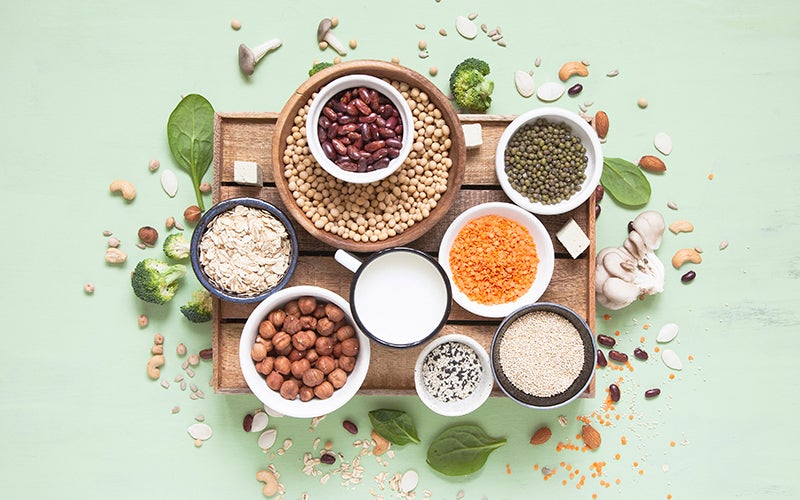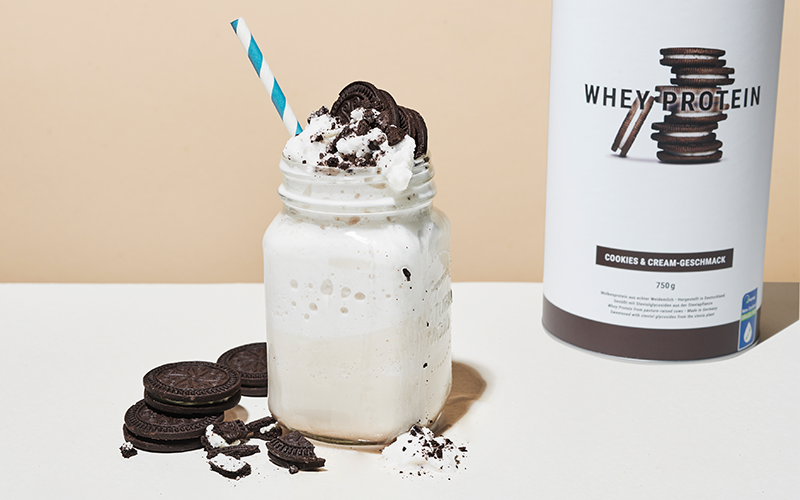30 High Protein Foods to Amp Your Muscles
 ©Maria Raz
©Maria Raz
Protein is the building block of your muscles – and it’s used in other spots around the body, too. So, high protein foods are must-haves in your diet. Take a deep dive into all things protein here and see our charts with our top 30: 15 each of the top animal and plant-based protein sources.
What kinds of foods contain a lot of protein?
Protein is a fundamental part of every cell in the body and is vital for building muscle and breaking down fat. Since it doesn’t produce its own protein, your body needs to get it through what you eat.
A balanced diet can easily hit your recommended protein requirements. Animal sources of protein, such as milk and dairy products, eggs, fish, and meat are one option. Whether or not you choose to eat animal products, we always recommend that you use plant-based proteins to provide some of the protein in your diet. Legumes, whole grains, nuts, and seeds are good plant-based sources of protein (and provide other important nutrients as well!).
There are tons of protein-rich foods out there, and some are a real powerhouse. Especially in stressful everyday life, these foods can help you meet your goals.
According to the European Health Claims Regulation, a food may only be labeled “high in protein” or “rich in protein” if at least 20 percent of the total caloric value of the food can be attributed to its protein content. Accordingly, a food is considered a good source of protein if at least 12 percent of its calories come from protein.
Animal products high in protein
Low-fat meats such as chicken or lean beef, and fish such as pollock, salmon, and shellfish are among the most important animal-based proteins. A balanced diet can be rounded out with eggs, milk, and dairy, although meat and fish have a higher protein content than dairy and eggs. Dairy products such as (Greek) yogurt, buttermilk, and kefir are particularly easy to digest.
Not sure how much protein you need? Check out our free Body Check. Define your goals, calculate your BMI, and get individually tailored training and nutrition tips now.Start your free Body Check now
TOP 15 animal protein powerhouses
| FOOD | Protein per 100g |
| Whey Protein | 80g |
| Beef jerky | 55g |
| Serrano ham | 30g |
| Harzer cheese | 30g |
| Anchovies | 29g |
| Tuna | 26g |
| Camembert | 24g |
| Venison | 23g |
| Turkey breast | 23g |
| Beef | 21.2g |
| Shrimp | 18.5g |
| Cottage cheese | 13g |
| Quark | 12.6g |
| Egg white | 11g |
| Low-fat (1.5%) yogurt | 3g |
High-quality protein for a successful workout
Have you been training at full speed to reach a new goal? Support your workouts with the right sports nutrition. In addition to a healthy and balanced diet rich in animal and plant proteins, you can, for example, promote muscle gain with a protein shake after your workout. Check out which of our Protein Shakes is best suited for your goals.
Join us in taking your training to the next level. Our high-quality protein products help you reach those targets. Each of our protein shakes promises you optimal nutrition for your fitness goals. Curious? See for yourself.

Discover our top protein products now
Whey protein is a classic go-to in the world of protein powder and shakes. It’s particularly suitable for strength and endurance athletes, as it contains high-quality protein building blocks and amino acids, which the muscles need for sustainable development as well as for regeneration. Whey is absorbed by the body extremely quickly and completely metabolized within 30-45 minutes after ingestion – so it’s your perfect companion after hard workouts.
Plant-based high protein foods
In addition to animal sources of protein, there are also protein-rich plant-based foods. Lucky for vegetarians and vegans, plant-based proteins are rich in carbohydrates, fiber, and phytochemicals. In contrast to animal protein sources, they’re cholesterol- and purine-free and also low in fat, which can have adverse effects on health. These substances are inevitably ingested through meat. The most important sources of vegetable protein include potatoes, vegetables, beans, lentils, and nuts. Certain whole grains can also help to supplement the protein requirements of a muscle-building diet.
Top 15 plant protein powerhouses
| FOOD | Protein per 100g |
| Sweet lupin flour | 39g |
| Hemp seeds | 37g |
| Soybeans | 34g |
| Peanuts | 25g |
| Pumpkin seeds | 24g |
| Lentils | 23g |
| Chia seeds | 21g |
| Almonds | 20g |
| Tempeh | 19g |
| Natto | 17g |
| Quinoa | 15g |
| Oats | 13g |
| Tofu | 11g |
| Bean sprouts | 6g |
| Brussels sprouts | 4g |
Do you eat a vegan diet and want to build muscle mass and strength effectively and sustainably? Or maybe working on getting fit and toned? Our plant-based protein products are designed to support you in achieving your individual goals. Learn more about our vegan power here.
Protein-rich food for a super boost of protein
Peanut Butter:
This nutty protein source is perfect as a snack, spread, topping, or sauce. Sweet or savory, peanut butter is a protein-rich go-to in any pantry.
They deliver high levels of fiber, protein, and polyunsaturated fatty acids, especially ideal for those on a diet.
Vitamins and minerals play a crucial role in supporting your training goals. Curious? Explore more here.
Animal and plant protein sources
Protein-containing foods – whether aimed for carnivores or vegans – satisfy almost all the requirements for optimal metabolism. Major differences come down to factors like their amino acid profile. Each source has its advantages and disadvantages, and the right combination of animal and plant protein sources can help ensure optimal results. The body cannot produce protein itself, so a protein-rich diet is important.
Utilization
In principle, both plant-based proteins and meat contain all 9 essential amino acids. However, animal proteins have a higher amount of these amino acids. As such, they’re more similar in composition to human body protein than protein-containing plant products.
The more a protein resembles endogenous protein, the higher its biological value. This means that the protein of protein-containing animal foods ingested from food can be utilized more easily due to the similar structure, so that it can then be converted into the body’s own protein.
Effects
Even though the protein content and biological value of protein-containing, plant-based foods is often lower than that of animal products, a healthy diet should still emphasize vegetables, legumes, and some grains. Compared to animal foods, plant-based proteins have a low fat content and fewer calories. Animal foods often contain saturated fats and high cholesterol, and form purines (uric acid). An excess of uric acid promotes obesity, cardiovascular disease, and fat metabolism disorders.
Getting the most out of high protein foods
Regular consumption of protein, no matter its origin, is essential in a healthy diet. A well-planned combination of both kinds of protein sources increases the biological value and thus the quality of the proteins.
This leads to a healthy, varied diet with complex carbohydrates, less fat, more fiber, and fewer calories. A mix of plant and animal foods is ideal, although vegetarian foods should be the primary source of protein. If your protein requirement is covered by a variety of protein-containing vegetables, potatoes, or nuts, you’ll also absorb important micronutrients such as vitamins, minerals, fiber, and trace elements.
Sources for this article
We at foodspring use only high-quality sources, including peer-reviewed studies, to support the facts within our articles. Read our editorial policy to learn more about how we fact-check and keep our content accurate, reliable, and trustworthy.

































